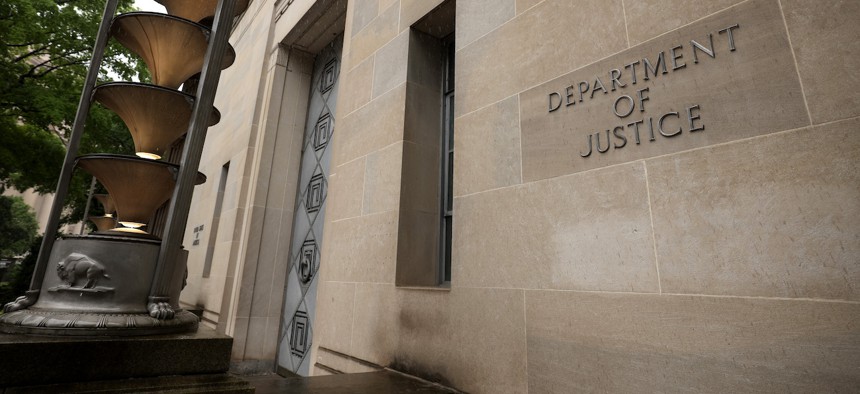
Since the CARES Act was enacted in March 2020, the Federal Bureau of Prisons has placed more than 12,000 individuals in home confinement. Kevin Dietsch/Getty Images
Coronavirus Roundup: Justice Department Releases Its Home Confinement Final Rule
There's a lot to keep track of. Here’s this week’s list of news updates and stories you may have missed.
The Justice Department issued a final rule on Tuesday granting discretion to the Federal Bureau of Prisons director to allow individuals placed in home confinement under the CARES Act to stay after the emergency period for the pandemic ends.
The Office of Legal Counsel issued a decision in December 2021 saying this is allowed, reversing a Trump administration determination.
The final rule “also allows the bureau to move individuals into Residential Reentry Centers when needed, including instances when home residence is no longer viable or due to either minor accountability issues or non-significant disciplinary issues,” said a press release from DOJ. Since the CARES Act was enacted in March 2020, BOP “has placed more than 12,000 individuals in home confinement under CARES Act authority” and “of those, only a fraction of 1% have been returned to secure custody due to new criminal conduct.” Here are some of the other recent headlines you might have missed.
Sen. Joni Ernst, R-Iowa, ranking member on the Senate Small Business Committee, recently raised concerns about reports that the Small Business Administration will be forgoing debt collections on COVID-19 Economic Injury Disaster Loans that are less than $100,000. The SBA watchdog has raised concerns about the agency’s decision to forgo collections on for the Paycheck Protection Program. Ernst also introduced a bill that would ban SBA from suspending collections on these loans.
“In total, the SBA could forgo collections on over $72 billion of COVID program loans without appropriate justification or authorization from Congress,” Ernst wrote to the Small Business Administration administrator. As underscored by the inspector general, “the longer SBA waits to begin repayment and collections, the less likely it is that taxpayers will ever be repaid.”
SBA and law enforcement authorities “are aggressively pursuing loans that are suspected cases of fraud,” Han Nguyen, a spokesperson for SBA, said on Friday. “As a result of decisions made by Congress to expedite pandemic relief, the use of collateral or personal guarantees – typically a SBA requirement -- was barred for all 3.6 million COVID-EIDL loans made under the Trump administration needlessly exposing taxpayer funds to unnecessary risk and complicating collection efforts.” Nguyen stated that “SBA’s position remains clear: Any borrower who took out a COVID-EIDL loan is required to pay it back and failure to repay has severe consequences that include being barred from other federal assistance and detrimental impacts on credit scores.”
The Health and Human Services Department outlined on Wednesday progress the administration has made addressing Long COVID-19 one year after the president directed the HHS secretary to take action. For example, “this month, HHS’s Agency for Healthcare Research and Quality will issue a new notice of funding opportunity to expand access to comprehensive, coordinated, and person-centered care for people with Long COVID, particularly in underserved, rural, vulnerable, or minority populations disproportionately impacted by the effects of Long COVID,” said a fact-sheet. Also, “the Veterans Health Administration now has 23 clinical facilities across the country with fully established Long COVID programs,”
The President’s Management Agenda, which outlines the administration's cross agency priority goals, seeks to “reimagine and build a roadmap to the future of federal work informed by lessons from the pandemic and nationwide workforce and workplace trends.” However, a watchdog says the White House has not sufficiently addressed requirements from a 2010 law on federal real property management goals. Overall, the GAO report says the Office of Management and Budget should improve its transparency of its cross-agency priority goals. OMB agreed with the findings, but disagreed with the recommendations.
Help us understand the situation better. Are you a federal employee, contractor or military member with information, concerns, etc. about how your agency is handling the coronavirus? Email us at newstips@govexec.com.







